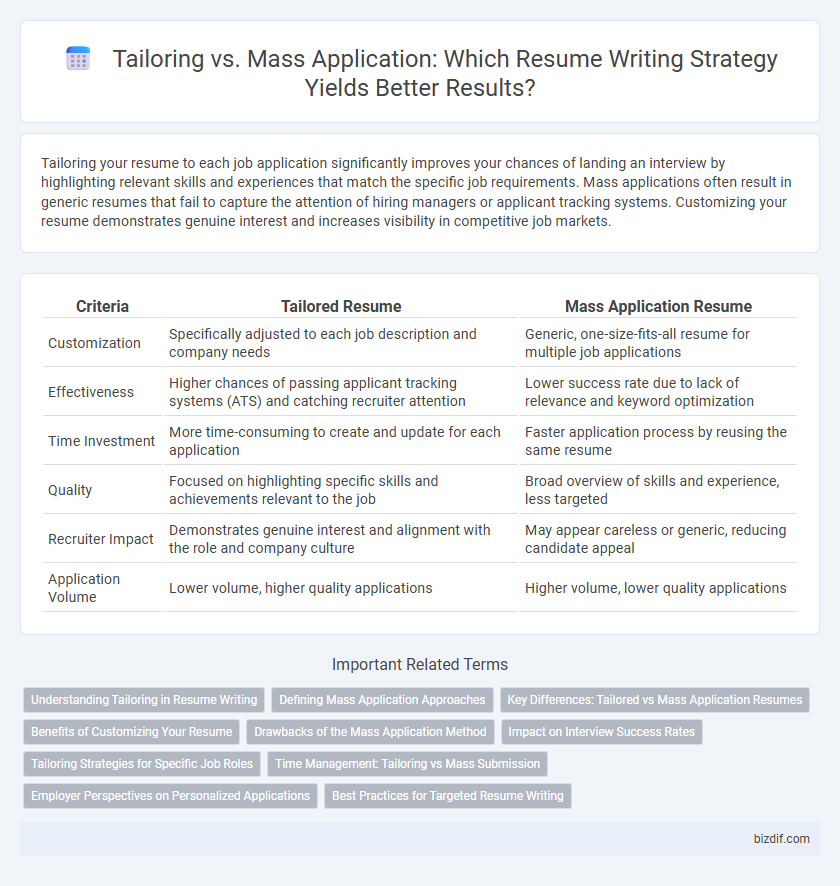Tailoring your resume to each job application significantly improves your chances of landing an interview by highlighting relevant skills and experiences that match the specific job requirements. Mass applications often result in generic resumes that fail to capture the attention of hiring managers or applicant tracking systems. Customizing your resume demonstrates genuine interest and increases visibility in competitive job markets.
Table of Comparison
| Criteria | Tailored Resume | Mass Application Resume |
|---|---|---|
| Customization | Specifically adjusted to each job description and company needs | Generic, one-size-fits-all resume for multiple job applications |
| Effectiveness | Higher chances of passing applicant tracking systems (ATS) and catching recruiter attention | Lower success rate due to lack of relevance and keyword optimization |
| Time Investment | More time-consuming to create and update for each application | Faster application process by reusing the same resume |
| Quality | Focused on highlighting specific skills and achievements relevant to the job | Broad overview of skills and experience, less targeted |
| Recruiter Impact | Demonstrates genuine interest and alignment with the role and company culture | May appear careless or generic, reducing candidate appeal |
| Application Volume | Lower volume, higher quality applications | Higher volume, lower quality applications |
Understanding Tailoring in Resume Writing
Tailoring a resume involves customizing content to align with specific job descriptions, highlighting relevant skills and experiences that match the employer's priorities. This targeted approach increases the likelihood of passing Applicant Tracking Systems (ATS) and capturing recruiter attention by emphasizing keywords and qualifications directly related to the role. Mass application strategies often result in generic resumes that fail to differentiate candidates or effectively showcase their fit for particular positions.
Defining Mass Application Approaches
Mass application approaches in resume writing involve using a generic resume template submitted to numerous job postings without customization for specific roles. This method prioritizes volume over personalization, aiming to reach a broad audience quickly. Although efficient, mass applications often reduce the impact of key skills and experiences that align closely with individual job requirements.
Key Differences: Tailored vs Mass Application Resumes
Tailored resumes are customized for each job application, highlighting relevant skills, experience, and keywords that match the specific job description, increasing the chances of passing Applicant Tracking Systems (ATS). Mass application resumes use a generic format and broad language, which often fail to address the unique requirements of each position, leading to lower response rates. Employers prioritize tailored resumes because they demonstrate genuine interest and a clear alignment with the job's demands, making them more effective in landing interviews.
Benefits of Customizing Your Resume
Customizing your resume to match the specific job description significantly increases the chances of passing Applicant Tracking Systems (ATS) and catching the recruiter's attention. Tailored resumes highlight relevant skills, experience, and keywords, demonstrating your direct fit for the role. This targeted approach enhances engagement and improves interview opportunities compared to mass application strategies.
Drawbacks of the Mass Application Method
Mass applications often result in generic resumes that fail to highlight specific skills or experiences relevant to each job, reducing the chances of catching recruiters' attention. This approach increases the likelihood of being filtered out by Applicant Tracking Systems due to lack of keyword optimization. The lack of personalization can also convey a lack of genuine interest, diminishing overall application effectiveness.
Impact on Interview Success Rates
Tailoring resumes to specific job descriptions significantly increases interview success rates by highlighting relevant skills and experiences that match employer needs. Mass applications with generic resumes often result in lower response rates due to lack of customization and failure to pass applicant tracking systems (ATS). Data shows tailored resumes can boost interview callbacks by up to 50%, emphasizing the importance of targeted application strategies.
Tailoring Strategies for Specific Job Roles
Tailoring resumes to specific job roles involves customizing keywords, skills, and accomplishments to align precisely with the job description, increasing the chances of passing Applicant Tracking Systems (ATS). Highlighting relevant experience and quantifiable achievements demonstrates a clear match between the candidate's background and the employer's needs, making the resume stand out to recruiters. This strategic approach significantly improves interview callback rates compared to mass applications with generic resumes.
Time Management: Tailoring vs Mass Submission
Tailoring resumes for each job application significantly improves relevance and increases the chance of passing Applicant Tracking Systems by aligning keywords and skills with the job description. While mass submission of generic resumes saves time upfront, it often leads to lower response rates and wasted time on follow-ups and interviews unlikely to result in offers. Effective time management balances customizing key sections for high-priority roles while employing targeted templates for less critical applications to optimize effort and outcomes.
Employer Perspectives on Personalized Applications
Employers prioritize personalized applications because tailored resumes demonstrate a candidate's genuine interest and alignment with the specific job requirements, increasing the likelihood of a good fit. Mass applications often lack customization, making it difficult for recruiters to identify relevant skills and experiences quickly, resulting in lower callback rates. Personalized resumes optimize keyword use and highlight accomplishments directly related to the job description, enhancing applicant tracking system (ATS) compatibility and improving hiring outcomes.
Best Practices for Targeted Resume Writing
Tailoring resumes to specific job descriptions enhances keyword match and demonstrates relevant skills, increasing the likelihood of passing Applicant Tracking Systems (ATS). Researching company values and job requirements ensures each resume highlights quantifiable achievements aligned with employer expectations. Avoiding mass applications and focusing on customized content significantly improves recruiter engagement and interview callbacks.
Tailoring vs Mass Application Infographic

 bizdif.com
bizdif.com